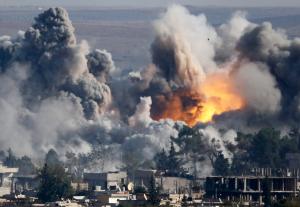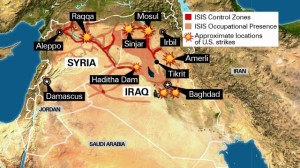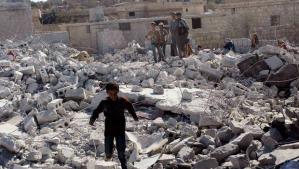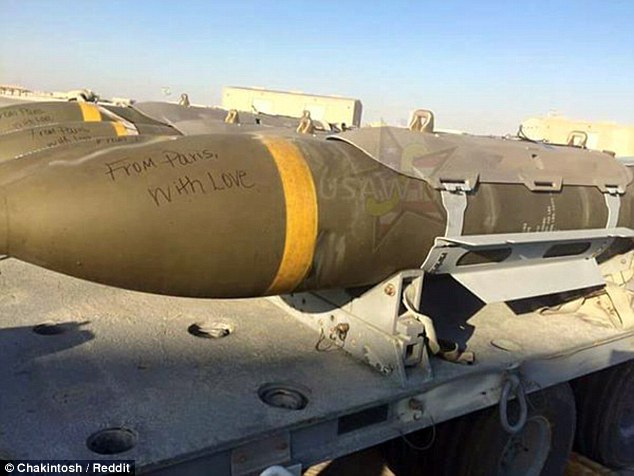Friday night gave the western world their clearest glimpse yet into the atrocities that ISIS are capable of. 129 people were murdered in Paris by ISIS gunmen and ISIS made bombs with many more injured. The barbarity of the acts committed by ISIS has left the world in mourning for the people of Paris and rightly so, the hashtag #prayforparis has been trending across social media since the attacks took place. The French President Francois Hollande declared that France is at war and has since shut France’s borders to all Muslims, the country has also stepped up its air strikes against ISIS. The harrowing picture on the left which has been shared all over social media indicates the animosity the public feel towards ISIS following the Paris attacks but it is important to remember that hatred breeds hatred and violence breeds violence – the war against terrorism is not a war that France nor any other country can win. Imperialistic politics simply does not work in the long term.
picture on the left which has been shared all over social media indicates the animosity the public feel towards ISIS following the Paris attacks but it is important to remember that hatred breeds hatred and violence breeds violence – the war against terrorism is not a war that France nor any other country can win. Imperialistic politics simply does not work in the long term.
Political imperialism has been a basic component of foreign policy throughout history. Japanese, Chinese, Roman, Byzantine and Persian empires have all established the practice of political imperialism in order to gain power, influence and money. The British post-colonial theorist Robert Young writes that Imperialism is a state policy and is developed for ideological as well as financial reasons. Indeed, at the heart of political imperialism is war and violence – remember, despite the cruelties caused, war is extremely profitable for some people.
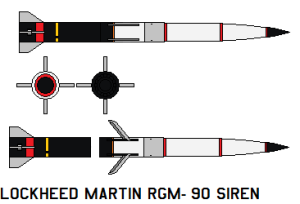
A Lockheed Martin created missile design
Defense and security companies such as Lockheed Martin and Boeing directly profit from war. In 2014, Lockheed Martin recorded profits of over $3.6 billion whilst Boeing’s net profits in 2014 were over $5.4 billion. The more war the more profit for Lockheed Martin and other defense contractors. Pope Francis recently spoke of how many companies across the world profit from war, he stated that these corporations make money that is drenched in blood, often innocent blood.
It was the Bush administration that took America and indeed Tony Blair’s Labour government to war with Iraq back in the early 2000s. Troops were also deployed in Afghanistan. President Bush’s war on terror probably did kill terrorists, however, it also killed millions of innocent civilians as well as ruin the lives of a countless amount of innocent people – the human cost of war is astronomical – and did Bush’s war on terror halt, stall or eradicate terrorism from the world? Absolutely not.
Under the Obama administration things have not changed. Indeed, US weapons exports under Obama have risen 23% since the Bush administration – not since World War 2 have US weapons exports been so high. It seems that the only plan the US seems necessary to implement on the fight against terrorism is to spend billions of dollars on weapons in order to ‘eradicate terrorism’. As history tells us – this plan does not work – terrorism has increased ten fold since 9/11 yet western governments are spewing out the same rhetoric again and again and again.
Since the Paris attacks David Cameron, Barack Obama and Francois Hollande have all stated how the western world is ‘under attack’ from these terrorists and that the only way to eliminate the threat of terrorism is to kill them – of course in political double speak world leaders do not word this in such a way. However, as aforementioned this does not work – Bush and Blair went to war to eliminate the threat of terrorism but they only succeeded in creating more terrorists at the cost of countless human lives and billions upon billions of dollars.
It goes without saying that the killing of innocent lives in order to adhere to a political agenda is both inhumane and not tolerated and rightly so, but to fight violence with violence is equally inhumane and has proven to just increase the threat of terrorism. The political commentary following the Paris attacks has bordered on barbaric. Twitter users and journalists alike across the western world have rightly criticised terrorism but with this has come vile hate speech directed at the entire religion of Islam – European citizens have demanded their borders be closed so as not to allow any more potential terrorists into their country – it seems that terrorists are ideologically from the middle east in nationality and are Muslim in religion – this suits western government narratives nicely. The consciousness of nations are being poisoned with imperialistic politics, we have unconsciously accepted that the only way to fight against violence and terrorism is to use our own breed of violence and terrorism.
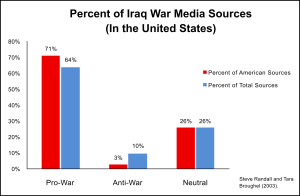
Pro war/anti war comparison of news sources during the 2003 Iraq war
The political imperialism of western countries in recent decades has unfortunately created many of the terrorist organisations that we see today – ISIS included. In the short term imperialism is a very profitable foreign policy – in terms of the 2003 American invasion of Iraq, defence contractors made money through the sale of weapons whilst the American government profited heavily from the occupation Iraqi oil fields. But fast forward 10 or so years and the foreign region where imperialism has been practiced (in this case Iraq) has been completely decimated and the people who once lived peacefully with their families (or at least more peacefully than they do now) have now turned to terrorism in order to initiate revenge against their oppressors.
Of course imperialism has its justifications – British social scientist John Hobson identifies this justification on the grounds that: “It is desirable that the earth should be peopled, governed, and developed, as far as possible, by the races which can do this work best, i.e. by the races of highest ‘social efficiency'”. As far as this description of imperialism is concerned these imperialist regimes fully believe that they have the worlds best interests at heart.
Each time a terrorist incident is recorded in the western world governments and the general public go into deep mourning in respect of the lost lives – after that governments increase their ground forces and/or air strikes against terrorist occupied reasons and a circle of death and ruin is created – this circle like terrorism will not come to an end so long as political imperialism and violence is used as a foreign policy.


